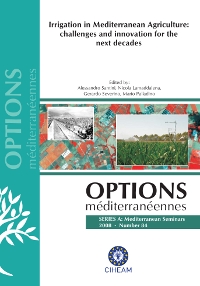| Article précédent | p. 93-104 | Article suivant |
Estimating of water requirement and problems related to the application of a technique for rice irrigation based on intermittent submersion and soil matric potential scheduling
The paper deals with results of an experimental study carried out in north-western Po valley, aiming at the determination of the irrigation water requirement for a rice crop irrigated on level-basin, with a water saving technique (WST) using, instead of the traditional technique of continuous submersion, the intermittent submersion planned with the measure of soil matric potential in the root zone. In order to study the irrigation management problems related to the application of (WST), we have estimated by means of a mathematical model of the overland flow, the cut-off time equal to the final advance time for all the levelbasins of a typical rice cultivated farm. The hydraulic parameters (infiltration and roughness) of the model were evaluated applying the continuity equation to the surface water profiles detected during the advance phase of three waterings. As shown by the results, in order to maintain the required matric potential values in the root zone, it is necessary to carry out a high number of waterings. Relief of the advancing surface water profiles made it possible to adequately determine the hydraulic parameter values useful for the application of the simulation model of the watering process. The applicatory interest of (WST) must be considered both in relation to the reduction of the seasonal irrigation water requirements and to the increase of the cost of labour, to the problems connected with the irrigation management at farm level, to the opportunity of the right-sizing of the fields and the irrigation network.
Cet article présente les résultats d'une recherche expérimentale conduite dans la Vallée du Pô au nord-ouest de l'Italie. L'étude vise à déterminer les besoins en eau d'une culture de riz, irriguée par une technique d'économie d'eau (WST) appliquant la submersion intermittente mesurant le potentiel matriciel de la zone racinaire, au lieu de la technique traditionnelle de submersion continue. Afin d'étudier les problèmes liés à la gestion de l'irrigation, on a calculé (avec un modèle mathématique) la durée d'arrosage correspondant au temps d'avancement final de la lame d'eau, pour tous les bassins d'une exploitation agricole typique cultivant du riz. Les paramètres hydrauliques (d'infiltration et de rugosité) ont été évalués, appliquant l'équation de continuité aux profils libres de l'eau avançant dans un bassin expérimental. Les résultats ont montré que, pour conserver dans la zone racinaire les valeurs prévues de potentiel matriciel, un nombre relativement élevé d'irrigations doit être effectué. La détermination de l'avancement des profils d'eau a permis l'évaluation des paramètres nécessaires à l'application du modèle de simulation. Afin de permettre une gestion rationnelle de l'irrigation même dans une exploitation agricole, l'intérêt d'application de la technique doit être évalué par rapport à la réduction des besoins saisonniers en eau et à l'augmentation du coût de la main-d'oeuvre ainsi qu'à la possibilité de redimensionner les exploitations à irriguer et le réseau de distribution.
- [ Afficher ]
- [ Télécharger ]
- [ Exporter la citation ]
Vous pouvez télécharger la citation au format :
- [ Imprimer ]
-
Mots-clés
BESOIN EN EAU, CONSERVATION DE L'EAU, IRRIGATION A LA DEMANDE, IRRIGATION PAR SUBMERSION, ITALIE, RELATION PLANTE EAU, RIZCiter cet article
Allavena L. Estimating of water requirement and problems related to the application of a technique for rice irrigation based on intermittent submersion and soil matric potential scheduling. In : Santini A. (ed.), Lamaddalena N. (ed.), Severino G. (ed.), Palladino M. (ed.). Irrigation in Mediterranean agriculture: challenges and innovation for the next decades. Bari : CIHEAM, 2008. p. 93-104. (Options Méditerranéennes : Série A. Séminaires Méditerranéens; n. 84). International Conference on Irrigation in Mediterranean Agriculture: Challenges and Innovation for the Next Decades, 2008/06/17-18, Naples (Italy). http://om.ciheam.org/om/pdf/a84/00800955.pdf



